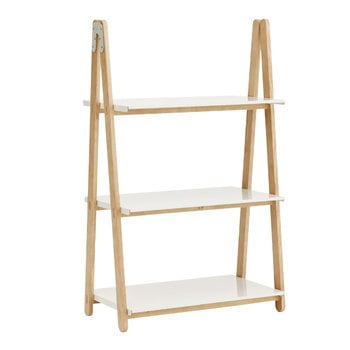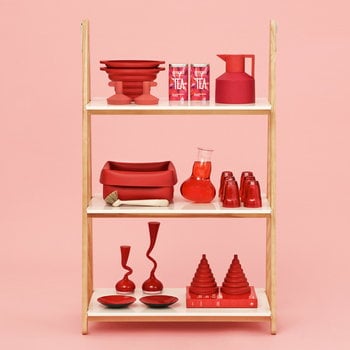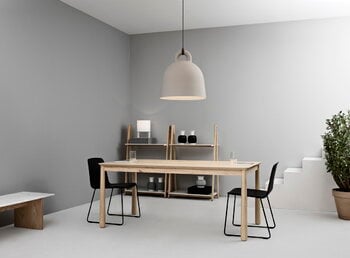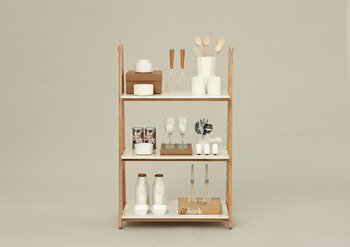One Step Up shelf has been designed for Normann Copenhagen by Francis Cayouette. It is a bookcase that combines form, material and function in a simple and chaste design. Francis Cayouette has been inspired by the ladder as object and he has created a new flexible piece of furniture ideal for storage. Francis Cayouette has used recognizable elements taken from the form of the ladder and incorporated its mobile attributes. Details such as the fittings are emphasized and bring authenticity to the object. The natural ash wood and the industrial metal shelves create dynamic and the exquisite materials work great together and create a complete expression. One Step Up creates room and frame for storage. Place various One Step Up bookcases beside each other and create your own bookcase system. One Step Up bookcase can also be used as a light room divider.
One Step Up shelf, low
Normann Copenhagen
Description
One Step Up shelf has been designed for Normann Copenhagen by Francis Cayouette. It is a bookcase that combines form, material and function in a simple and chaste design. Francis Cayouette has been inspired by the ladder as object and he has created a new flexible piece of furniture ideal for storage. Francis Cayouette has used recognizable elements taken from the form of the ladder and incorporated its mobile attributes. Details such as the fittings are emphasized and bring authenticity to the object. The natural ash wood and the industrial metal shelves create dynamic and the exquisite materials work great together and create a complete expression. One Step Up creates room and frame for storage. Place various One Step Up bookcases beside each other and create your own bookcase system. One Step Up bookcase can also be used as a light room divider.
Product details (6)
- Colour
- Natural ash, white
- Width
- 78 cm
- Depth
- 45 cm
- Height
- 126 cm
- Main material
- Shelfs: metal
- Weight
- 21 kg
- Product ID
Designer
The Canadian Francis Cayouette (b. 1969) studied in Montreal and Paris. From 1999 onwards he has had his own office, Unit10, in Copenhagen. He has designed several different products from home accessories to clever storage units and elegant lifestyle products. The design of Cayouette is characterized by a strong empathy for everyday life and a industrial and practical approach on design.
View all productsReviews (1)
4
Based on 1 reviews
-
J
Johanna T
112 days ago
Sustainability
The Product Sustainability Framework, our criteria of sustainable design, helps you find the most sustainable products in our selection. Read below which sustainability criteria this product has met.
Working conditions & labour 7/9
-
Equal opportunities for all employees
-
Commitment to UN Global Compact, fair compensation for all employees
-
Corporate responsibility requirements defined and communicated for suppliers
-
Systematic work for improved inclusion and well-being in the workplace
-
Transparent supply chain
-
Suppliers' compliance to a code of conduct ensured
-
Compliance to the UN Guiding Principles on Business and Human Rights ensured in the supply chain
-
Direct suppliers audited and certified
-
Support for community involvement in the supply chain
Eco-friendly production 6/9
-
Fair and resource-wise water-use in production
-
No incineration or landfilling of returned items
-
No use of endangered species as materials
-
No direct environmental emissions or waste (excl. GHGs) from production
-
Material-efficient and ecological packaging
-
No potentially harmful chemicals used in own production
-
The sustainability of direct suppliers' production is addressed and monitored
-
Production and material sourcing that respect biodiversity, animal rights, and natural ecosystems
-
Positive impact on nature’s well-being through operations that regenerate natural ecosystems
Climate impact 4/8
-
Company's direct greenhouse gas emissions identified and commitment to reduction
-
Product's carbon impact identified and commitment to reduction
-
Guidance on energy- and eco-efficient use of the product
-
Contribution to climate initiatives beyond the brand’s direct operations
-
Low-carbon or compensated transportation
-
Carbon footprint of the product calculated and goals set to reduce it
-
100 % renewable energy in own production and operations
-
Carbon neutral or carbon negative product
Sustainable materials 3/6
-
Sustainable and long-lasting material choices
-
No harmful or hazardous substances
-
Responsible raw material sourcing and production
-
Materials suited for circularity: monomaterials, recyclable finishings, renewable or recycled contents etc.
-
Ecological materials: natural, biodegradable, recyclable or recycled contents
-
Outstanding materials in terms of innovativeness, responsibility, sustainability and circularity: local production or sourcing, 100 % recycled content, C2C-certification etc.
Circular design 3/5
-
High aesthetic quality promoting long-term use of the product
-
Technically durable product design and material choices
-
Design for enduring life-long quality
-
Design and support for product maintenance, repair and upgradability
-
Innovative circular design solutions: circular service system, resale platform, remanufacturing, collection of used products, etc.











